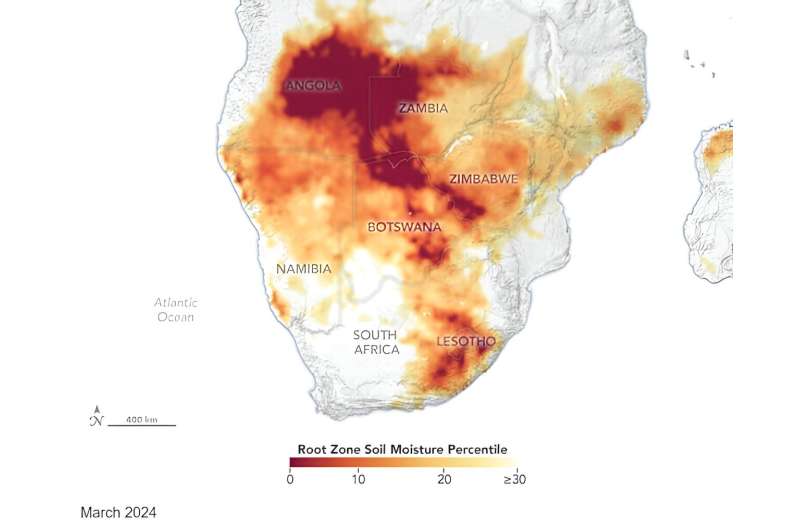This article has been reviewed according to Science X's editorial process and policies. Editors have highlighted the following attributes while ensuring the content's credibility:
fact-checked
proofread
Southern Africa drought crisis demands fresh solutions

Innovative solutions and emergency funding are critical to help the more than 30 million people in Southern Africa affected by drought who now face severe food insecurity and humanitarian challenges, UN agencies and governments warn.
The El Niño climate pattern, which started globally in July 2023, has led to a severe rainfall deficit across the region, with temperatures five degrees above average.
February was the driest in 100 years, with just a fifth of the usual rainfall for the month, in a region where 70% of people depend on rain-fed agriculture to survive, according to the World Food Program (WFP).
Now, the window of opportunity is rapidly closing to prevent a large-scale humanitarian crisis, UN agencies warned at a briefing in Pretoria, South Africa, on June 5, with widespread harvest failures imminent.
Affected communities say it is the worst drought they have ever experienced.
Wikala Kaideni, a smallholder farmer from Lekerenji village in the Chikwawa district of southern Malawi, told SciDev.Net that he and his family were facing starvation after their entire crop wilted.
"During a normal season, we harvest at least 30 bags of maize, but this season the dry spell scotched the maize at the flowering stage," said Kaideni, standing with his wife and 7-month-old baby.
"The maize dried up and we did not harvest anything."
Malawi, Zambia and Zimbabwe have declared national disasters after crop failures triggered widespread food insecurity and displacement of people.
In Malawi, one of the hardest-hit countries, the government and UN partners say innovative strategies are needed to increase food production and build resilience.
Irrigation is critical
The WFP says expanding irrigation across the region is critical, yet funding shortfalls have hampered these efforts.
Moses Chimphepo, director of preparedness and response at Malawi's department of disaster management affairs, says irrigation farming is one solution the country is exploring.
"We are also mindful of the fact that a lot of people don't have food and therefore we have another component of humanitarian assistance," Chimphepo told SciDev.Net.
"We are looking at two aspects: providing some food to some families or providing some cash transfers."
The El Niño impact is exacerbating the devastating effects of the climate crisis in Malawi and compounding the impacts of tropical storms and cyclones in 2022 and 2023, according to the WFP.
Rebecca Adda-Dontoh, UN resident coordinator for Malawi, told SciDev.Net that communities in the country had been involved in watershed management activities, including construction of dams, eyebrow basins, trenches and community access roads, as well as tree regeneration.
She said the UN was committed to supporting Malawi and other countries affected by the fallout from El Niño, to build resilience to future shocks.
Long-term solutions
"In the long term, we're looking at re-growing trees and positioning communities to access carbon credits, addressing climate change impacts," Adda-Dontoh said.
"This approach will help communities adapt to climate change and reduce their vulnerability to future disasters."
Reena Ghelani, UN assistant secretary-general and climate crisis coordinator for the El Niño Response, told SciDev.Net during a visit to affected families in Malawi last month that immediate action was needed.
"We're seeing a horrendous drought, but we're also seeing opportunities for innovation," she said.
"We must act now to address the escalating disaster."
She highlighted the importance of supporting smallholder farmers, particularly women, who are critical to food production.
"We must empower them with climate-resilient agricultural practices and access to markets," she added.
Provided by SciDev.Net




















